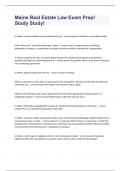Summary
Summary CML2010S Exam Notes: Insurance
- Course
- CML2010S Business Law II
- Institution
- University Of Cape Town (UCT)
textbook and lecture summary of the Insurance section Textbook D Collier-Reed and K Lehmann (eds) Basic Principles of Business Law (2nd ed; 2010)
[Show more]





